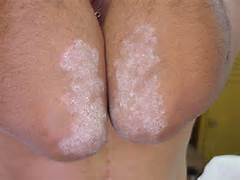Plaque Psoriasis: Signs and Triggers of Most Common Type of Psoriasis
The most common type of psoriasis, plaque psoriasis, affects 90% of the people living with this disease. Initially, most people do not know what is wrong with their skin and in some cases, a dermatologist may even require a biopsy to determine if you have psoriasis, though this is atypical.
While no cure currently exists, science has provided many treatments and with on-going research, you can hope the near future holds a therapy that permanently rids you of this ailment.
Signs
Scientists say most of the population carries the gene responsible for psoriasis, however, most people do not develop any form of this skin problem. However, it is still quite common, but not so common one cannot mistake it for something else, like chickenpox.
Plaque psoriasis appears in red oval patches, though sometimes in odd shapes as well, which may be big or small. These patches can appear anywhere on the body, including the scalp, fingernails and genital regions, though the joints seem to be the most commonly affected areas.
In addition to being red, the patches usually have a silvery, white layer covering them. This layer consists of scales that lie on top of the skin and cause discomfort by making you itchy or in providing a burning feeling. When these flare ups occur, it is usually for at least a month but can be much longer depending on your individual case. In some instances, the psoriasis does not go away but in others, it goes into remission during which time, no outbreaks occur and if so, they are very mild.
Plaque Psoriasis Triggers

Plaque psoriasis lies dormant in many individuals until a specific trigger sets it off and creates an outbreak. The triggers vary significantly from something as simple as stress to fatal illnesses such as AIDS. A child can get psoriasis after a strep throat or respiratory infection, though neither actually causes the disease. Some other triggers might be:
- Excessive alcohol consumption
- Under or over exposure to the sun
- Dry air or skin
- Damage to the skin, such as a burn or bug bite
- Viruses and Bacteria
Additionally, certain medications, particularly those used to treat heart disease, blood pressure or cholesterol can act as triggers for psoriasis.
Home Remedies
The prescription medicines associated with treating plaque psoriasis tend to be very strong, therefore having negative side effects if used for too long. These medicines may also become financially burdensome over time and some you cannot use every day, such as light therapy.
For these reasons, you might explore some simple home remedies, which you can use along with or separate from your prescription medications, should you choose to take any at all.
Oatmeal or sea salt infused baths are a common and soothing way to treat psoriasis as they help soften the skin and disinfect the open cracks and cuts. Enjoying natural sunlight responsibly offers another simple, at-home remedy that is free and effective. Additionally, engaging in any activity that helps you relax and avoiding stressors can prevent or alleviate outbreaks along with symptoms.
Support
One of the best things you can do to help your psoriasis is have support. Plaque psoriasis is not an easy illness to deal with because you cannot keep it a secret and although it does not affect the length of your life, it can most certainly affect the quality.
Having a strong support system, or building one through online forums, blogs, chats and neighborhood groups helps to keep you mentally strong and emotionally stable. Accepting your new life with psoriasis is no easy task and you should ask for help, as you do not have to go through this alone.
What helps/works for me
Natural Shower gel (without any colors or perfumes)
Plaque psoriasis, more information about the different types of psoriasis, here
Back to topNational Institute of Arthritis and Musculoskeletal and Skin Diseases
 Psoriasis en la pierna
Psoriasis en la piernaPágina de inicio
Mapa del sitio
Mapa del sitio en orden alfabético
